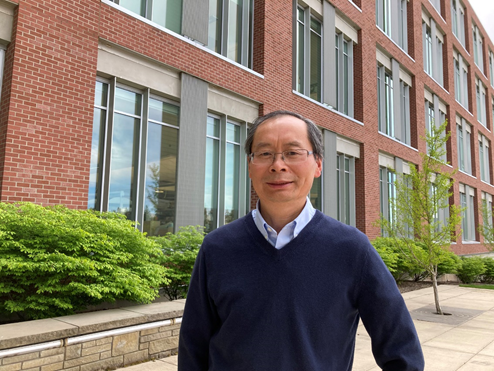|
|
|
Chair
Brenda Murdoch
University of Idaho
Moscow, ID United States

Term of service (1st, 2023-2027)
Member
Zhihua Jiang
Washington State University
Pullman, WA United States

Term of service (2nd, 2025-2027)
Dr. Zhihua Jiang is currently a Professor of Genome Biology in the Animal Sciences Department at Washington State University. He has more than 35 years of experience in higher education. Dr. Jiang completed his undergraduate and graduate programs in China and Croatia; received professional training in Germany, Scotland and France; and served as a professor in China, Canada and USA. In 2007, he became a fellow member of the Obesity Society. From 2010 to 2011, Dr. Jiang received 8 U.S. patents for biomarkers that were well utilized in initiation of genomic selection. In 2022, Dr. Jiang received a prestigious Fulbright Scholarship to Australia. His current work focuses on developing the central dogma of phenomics using state-of-the-art genomics and transcriptomics approaches in combination with bioinformatics and cell/embryo biology with goals to promote genomically optimized livestock farming (GOLF) innovation for maximizing bioeconomy and thus address food security for generations to come.
Member
Simon Lashmar
Agricultural Research Council
Pretoria, South Africa

Term of service (1st, 2023-2025)
Dr Simon Lashmar is an early-career, emerging researcher, and PhD Animal Science graduate (University of Pretoria), with a specialization in Animal Breeding and Genetics. His research focuses on molecular genetics (or genomics) applied to the livestock industry (including, but not limited to, ruminant species). He has a specific research interest in the local animal genetic resources of southern Africa. He devotes his research endeavours towards elucidating their unique genomic architecture and the adaptive mechanisms that make them relevant/important to sustainable farming/production. After his PhD, he also worked for Inqaba Biotech as a genomics specialist, completed a postdoctoral fellowship at the University of Pretoria, and is currently a researcher in Animal Breeding & Genetics at the Agricultural Research Council’s Animal Production Institute. As an early-career, young researcher, he has published research papers in various local and international peer-reviewed journals, been involved in undergraduate and postgraduate student training, and secured a role as councillor on the South African Society for Animal Science (SASAS) Main Council.
Member
Wansheng Liu
Penn State University
University Park, PA United States
Term of service (1st, 2023-2025)
Member
George Msalya
Sokoine University of Agriculture (SUA) and Tanzania Dairy Board (TDB)
Morogoro, Tanzania, United Republic of

Term of service (1st, 2023-2025)
George Mutani Msalya is a national of Tanzania and has been an academician at Sokoine University of Agriculture (SUA; https://www.sua.ac.tz/) since 2011, where he has climbed from the position of assistant lecturer to the current rank of associate professor, teaching as well as conducting research and conslutancy in his area of specialization. Msalya completed a master’s and PhD in cattle molecular genetics, specializing in prion genetics, from Kagoshima University (https://www.kagoshima-u.ac.jp/) in Japan in 2011, having obtained his bachelor’s degree in animal science from Sokoine SUA in 2003. Msalya’s major accomplishments in genetics include successful crossbreeding of milk animals suitable for the Tanzanian environment, involving Boran × Friesian cattle as well as Small East African × Norwegian Landrace goats. Msalya has supervised 7 PhD, 13 MSc, and about 100 BSc students’ research projects. Moreover, he has conducted 11 research projects and 3 consultancies with collaborations in more than 10 international universities, including Iowa State University, Missouri State University, Tamil Nadu University of Veterinary and Animal Sciences, and Kunming Institute of Zoology. He has over 100 publications and has presented at 29 conferences and attended more than 46 workshops and webinars. Msalya holds membership in 7 professional societies, including International Society for Animal Genetics (ISAG 27259196; 931412; FASS ID 84903) since 2008. In Tanzania, Msalya has served in the Tanzania Society for Animal Production (https://www.t-sap.org/) as secretary general since 2017. Besides teaching, Msalya was appointed to serve the position of registrar/CEO of the Tanzanian government’s dairy institution (https://www.tdb.go.tz/) in 2021. His current research activities since 2017 include characterization and genomic analyses of the native cattle and pigs of Tanzania.
Member
Siham Rahmatalla
Humboldt University-Berlin
Berlin, Germany
Term of service (2nd, 2025-2027)
Member
Imtiaz Randhawa
The University of Queensland
Gatton, Australia

Term of service (2nd, 2025-2027)
Dr. Imtiaz is a leading geneticist with expertise in animal genomics. He earned his degree in animal husbandry in 2003 and an MSc (Hons) in animal breeding and genetics in 2005 from the University of Agriculture, Faisalabad. During his PhD at the University of Sydney, he developed innovative bioinformatics tools such as Meta Selection Scores (MSS) and Composite Selection Signals (CSS), enhancing the understanding of historical selection in global cattle breeds. Dr. Imtiaz has also developed the new poll gene test for cattle, performed extensive genetic evaluations of beef cattle, and is contributing to the development of immunocontraceptives for cattle. His research positions span institutions such as the University of Agriculture Faisalabad, University of Veterinary and Animal Sciences Lahore, University of Sydney, James Cook University, and The University of Queensland.
Dr. Imtiaz's research focuses on molecular genetics, genomics, and breeding, analyzing phenotypic and genomic data across species such as buffalo, cattle, sheep, goats, and more. He specializes in characterizing genetic architectures related to complex traits crucial for adaptation, production, and welfare. Using high-performance computing and programming languages like R, Plink, and Python, he investigates gene variations, expression patterns, and regulatory networks with agricultural, environmental, and economic significance. His contributions continue to advance genetic research and its application in breeding and management of ruminants.
|
|
